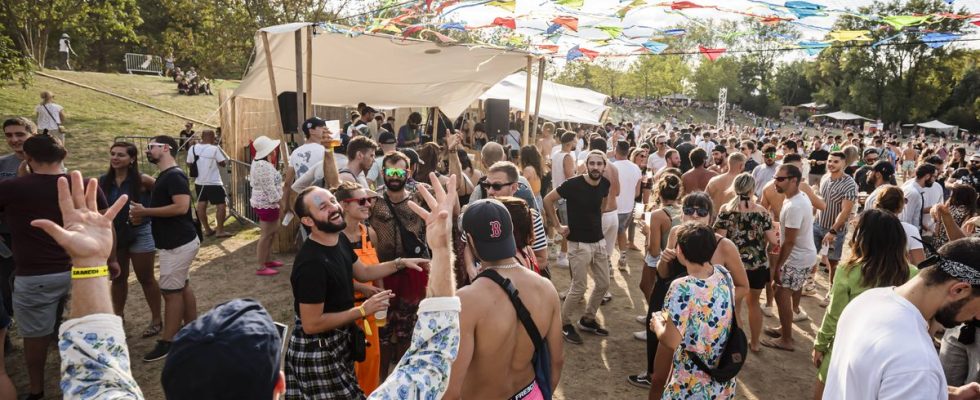His story began like many others. At the end of the 1990s, a group of friends decided to have an evening in the woods to celebrate the birthday of one of them and twenty-five years later, the event brought together dozens of artists and nearly of 45,000 people. Yet the Woodstower has stood out since its creation for its desire to organize a festival that is more respectful of the environment.
A commitment that materialized in 2005, when it relocated 15 km from the center of Lyon, to the Grand Parc de Miribel Jonage, in a natural area of 2,200 hectares, classified Natura 2000. Since then, this musical event has been working every year to develop new actions around all aspects of sustainable development. This year again, for its 24th edition, which begins this Wednesday and lasts until Sunday, the event continues its approach and remains a pioneer in the field of ecological music festivals.
Woodstower, a testing ground
“From transport to the plate, from waste to energy, everything is in place to make the party a sustainable, virtuous and unifying event! “, is it written in the Woodstower press release for this new edition. Thus, a self-service bike station is set up especially for the event, convoys between cyclists are planned, public transport is adapted and carpooling is encouraged. In terms of catering, 90% of products are organic and local, cooking oil is recovered and this year, 100% of snacks are vegetarian.
“We have dry toilets, a brigade that raises awareness and collects waste and cigarette butts. Drinking water is freely available, which has allowed the removal of nearly 35,000 plastic bottles, continues the director. On the scenographic level, it is designed from recycled or resourced materials. We obviously have returnable cups. The furniture comes from Emmaüs. We pay attention to every detail to reduce our carbon emissions, right down to the printing of the posters. The festival thus favors local service providers. And to go further in the process, for the third edition, it is proposing an ecovillage, open to everyone, with conferences and workshops to “raise public awareness of environmental but also societal subjects”.
However, despite all these commitments, “everything is not perfect”, agrees Maxime Noly, aware of “the room for improvement to be made”. He cites in particular “the problem of disposable dishes” or “the subject of electricity”. Since the site cannot be connected to the network, Woodstower is in “ecological transition” in partnership with Enedis to use energy from a battery, charged by solar panels, and do away with generators. “One of the other axes of development is the case of artists, adds the organizer. Today, 40% of our programming is made up of personalities who come from the local scene. We can still do better. »
The identity of the Woodstower festival endures over the years
Although the Woodstower celebrates its 24th edition this year, its identity centered on sustainable development has always endured. “At the time, it was obvious for the organizers but it was very precursory, explains the current director. The challenge is precisely to keep, over the editions, this historical and founding flame to remain faithful to the soul of the initial project. The organizers then created an ethical charter a few years ago to “set a framework”.
“It’s as essential for us as it is for the volunteers and the festival-goers,” assures Maxime Noly. The commitment is very marked in our teams who are involved above all for these values and continue to bring them to life through this project. In recent years, many people who have purchased a ticket have mentioned as a reason, the desire to participate in an ecological musical event. »
Far from the statistics of We Love Green or Cabaret Vert with 100,000 and 125,000 festival-goers respectively, the Woodstower reached 43,000 spectators for its 23rd edition. “For us, it’s enough, assures Maxime Noly. The desire for an event like this is rather to always want to grow, but we think that from a sustainable development point of view, it doesn’t make sense. Is having 40,000 people a day really eco-responsible? To continue to be what we are today, we rather advocate the fact of having a reasoned gauge ”. This is also recommended Shift project, in its report published in November 2021 to “decarbonize culture”.

